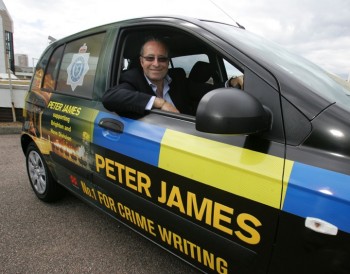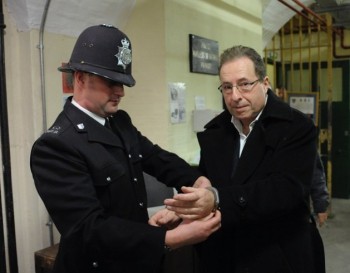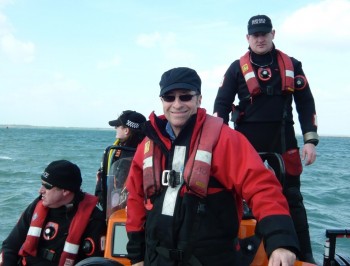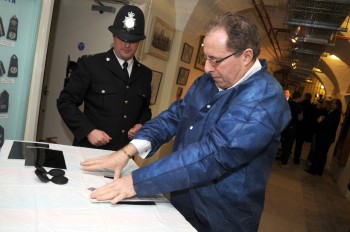You Are Dead by Peter James
Building the Scariest, Smartest Villains
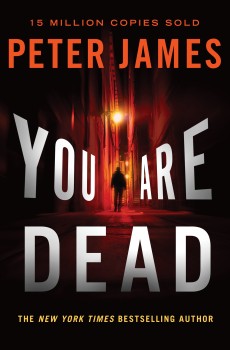 By James Ziskin
By James Ziskin
Peter James writes terrifying thrillers. The kind you know are going to scare you, but you read them just the same, because once you start, stopping is not an option. You know the scary parts are coming, but you can’t look away. James’s realistic, nail-biting police procedurals and their popular hero, Detective Superintendent Roy Grace, have earned him a bushelful of prestigious awards on both sides of the Atlantic and in France. But it’s not just Roy Grace who keeps James’s millions of readers turning the pages. His villains are the smartest, scariest, and most complex bad guys you’ll find anywhere.
James has written 28 novels, including 11 in the wildly successful D.S. Roy Grace series. The latest installment is YOU ARE DEAD, which follows Grace’s harrowing pursuit of a twisted serial killer.
I had the pleasure of talking to Peter James about his latest book and even managed to squeeze in some questions about writing and his career as well.
YOU ARE DEAD is the 11th novel in the wildly popular Detective Superintendent Roy Grace series. More than 16 million books sold. Sorry, let me just say that’s a lot of books. Readers and writers are always interested to learn about the journey. Has this series met your expectations? Or did you dream of even wilder success? Tell us about your writing aspirations before you made it big.
I never started out with a finite number of Roy Grace books in my head–and I never imagined, in my wildest dreams, the global success that Roy Grace would have. I love writing these books more than anything I have ever done in my life and just so long as my readers keep enjoying them and wanting more, I will continue. The success of these novels has totally astonished me, I never expected him to be this popular–and it is wonderful –I’m immensely grateful to all my readers and, of course, now I feel very protective of him!
In the early days I had years of rejection letters as an unpublished author. It was as if there was a wall, like a Berlin wall, on one side of which were the publishers and the published authors, and on the other side were all those desperate to be published authors–and never the twain should meet. I became hugely despondent in my mid-twenties, really believing that the dream I’d held since the age of eight, of being a published author, would never come true. I resigned myself to the fact that I would never be any good at writing novels, that I just did not have what it took.
I think all of us are the sum of our parts, so I would have to question whether, if I went back into the past and changed anything, I would be lucky enough to be so successful over again. Writing is a craft, no different at certain levels to other crafts. A wannabe carpenter’s tenth table is going to be better than his first, because practice does make perfect, or at least less bad! My first novel was actually my fourth–I had written three novels in my late teens and early twenties, which, luckily, never got published, before my fourth. But I was to write a further four before I finally achieved my ambition, to make the Top 10 best-sellers list, and exceeded it by reaching No 1. Knowing what I know now, I don’t think I would do anything different. Instant success can be a dangerous thing. I’ve seen so many writers get a massively hyped first novel, and then struggle for the rest of their careers to match it–and rarely do. I am very happy with my lot, an overnight bestseller that took 31 years to get there!
YOU ARE DEAD presents readers with a terrifying villain, a serial killer preying on young women of certain profile in Brighton. You’ve made a deep study of serial killers, from Ted Bundy to Dennis Rader (BTK) to Harold Shipman. What is it that fascinates us about them? Why do we enjoy reading about them?
I think we are fascinated by how the most seemingly normal people often are the most monstrous criminals. You mention the UK’s worst ever serial killer, Dr. Harold Shipman, and he is a classic example, but there are many more. One aspect that particularly fascinates me is just how many of the worst violent criminals are, outwardly, such seemingly innocuous people. Shipman was a much loved family doctor, who just had a penchant for killing his patients, and murder up to 350 of them. Ted Bundy, one of the US’s worst criminals, raped, murdered, and butchered over 35 women, yet was witty, bright, charming, and had worked as a lawyer for the Republican party. The UK’s James Lloyd, who inspired my 6th Roy Grace novel, Dead Like You, brutally raped as many as 126 women, then took their shoes as trophies, yet was a family man, with two children who adored him, a responsible job; he was a Freemason, and a pillar of his community.
What is the difference between these people and ourselves? What is it that stops us doing the same –or makes them want to what they do? Are they hard-wired differently, or just brought up in some way that warped them? Or is there no difference at all? Could we be like them at some future point in our own lives? What would that feel like? Would we be able to live with our consciences?
We can understand the motives of many murderers. A partner who kills their loved one in a fit of jealous rage. A ruthless armed robber who shoots out of greed. The terrorist who kills out of warped ideology. The professional hit man who kills for a fee. The husband who buries his wife beneath the kitchen floor because he’s fallen in love with someone else. But it is the serial killer intrigues and chills us the most. The person who kills for sheer pleasure or satisfaction, the gratification derived from the act, driven by a mindset that is sometimes beyond comprehension, sometimes alien – and always repugnant to decent human beings. And the scariest thing about most of these is their cunning. Serial killers who get away with it for years–and sometimes decades–are often highly intelligent chameleons who blend into society, unsuspected by family and friends.
In my research to create my central villain for this novel, I eventually singled out four names. These came from a catalogue, hundreds of pages long, of murderers who have taken three or more lives at different times – the actual definition of a serial killer. Ted Bundy. Dennis Rader. Harold Shipman. Dennis Nilsen. What fascinated me about these was how, outwardly they seemed very respectable men. Shipman was a well-loved family doctor. Nilsen was in the army, then a police officer, then Executive Officer for a Job centre. All four of these got away with their killings over many years. Each of them very nearly got away with it completely.
Bestselling author Simon Toyne interviewed Peter James at Thrillerfest in 2015 as part of his continuing series of conversations with authors. Here is the Toyne/James’chat:
Is it wrong that we enjoy reading fictionalized accounts of serial killers?
Crime touches all of our lives in some ways, constantly. In our modern, civilized life of today we lock up our homes, lock up our cars, keep a careful hold on our wallets and bags; we receive countless emails from villains trying to get into our bank accounts, steal our identities or defraud us of all we have. We live under the shadow of terrorism, deception from trusted friends, random violence, the tax man. One small slip – such as having an accident while driving and texting – or a lover’s tiff that goes a step too far – can send any of us spiraling down the dark tunnel of the criminal world, where our lives will be changed for ever. Murder is the worst, and the crime that has fascinated us since earliest times. For murder is the one crime that cannot ever be reversed.
Are there subjects/crimes you won’t touch?
There are certain subjects I won’t touch, for example pedophilia, but in reality there is very little an author can write that is as horrific as some of the real life crimes perpetrated by sadistic murderers and serial killers. I never start out a novel thinking about raising the bar on the level of violence, and whilst I have whatever violence is necessary for my story, I try to limit it. I don’t want to gross out my readers, or having them throwing up! For me it is much more about firing my readers imaginations than presenting them with lurid gory descriptions.
Thanks to your Roy Grace novels, I’ve fallen for Brighton. Places as characters may be an overused trope, but Brighton and Sussex are integral to your stories. Tell us why you set your Roy Grace books in Brighton. Could you have set them elsewhere?
For me there was only ever one location for Roy Grace to be based….my hometown of Brighton. To the outsider, Brighton is a hip, beautiful seaside city, but it has a long history of darkness, right back to its roots as a smugglers village! In Regency days it gained a reputation both as a fashionable bathing resort, but in 1841 when the London-Brighton railway line opened, criminals flooded down from London, finding rich pickings and a much nicer environment than their city! They brought cock-fighting, prostitution, pick-pockets, muggers, smugglers, burglars, and gangs. Simultaneously, with the railway enabling quick access from London, many wealthy Londoners brought their mistresses down here and it became known as a place for “dirty weekends”.
Three consecutive past Chief Constables of Sussex Police have all told me that Brighton is the favored place in the UK for first division criminals to live in. The reasons are: Firstly it has a lot of escape routes, very important to all criminals: It has the Channel ports, Eurotunnel, and Gatwick Airport just 25 minutes away. London is only 50 minutes by train. It has a major seaport on either side–Shoreham and Newhaven, perfect for importing drugs and exporting stolen cars, antiques and cash. It has the largest number of antique shops in the UK–perfect for laundering stolen goods and cash. For many recent years it held the title the Tourist Board do not like me mentioning: “Injecting Drug Death Capital of England!” It has a wealthy young population combined with the largest gay community in the UK, providing a big market for recreational drugs. It has two universities, so a big drug-taking student community. A huge number of nightclubs and a large transient population. Very importantly it has not been over-written by other writers. The only previous author to delve seriously into its criminal underbelly, and quite brilliantly, was Graham Greene in Brighton Rock in 1938.
Your books follow a long, linear narrative arc, with plot lines continuing through multiple novels. I’m thinking of Sandy, but not only. Some villains as well, and even Cassian Pewe. I think this creates a realistic world. Roy Grace’s life is not compartmentalized into neat stories in distinct novels. It’s a continuum. Where do your stories end?
As long as my readers want to read them, I will write them!
You depict the administrative aspects of police work with fascinating detail. You go beyond simple procedural and write convincingly about the internal politics, time off, press relations, promotions, and disciplinary actions. Can you talk a bit about the importance of these nuts and bolts and how they build verisimilitude?
Today I spend an average one day a week with the Police, either in a patrol car, or an office, or at a crime scene, or on a raid, or with their Intelligence or forensic or search units – there are so many different parts to their work. I even have my own police car in Brighton! My publishers donated it to Sussex Police and it drives around with my name all over it. I often get inspiration from things the police tell me, or cases that officers are involved with. I believe to portray them credibly I need to be to a considerable extent involved in their lives, not just at work but when they are off duty. Many police officers only socialize with others in the police too – they feel more comfortable that way. They don’t have to worry about giving away secrets to a prying member of the public, or saying something offensive that might come back to bite them. My character of Roy Grace is based on a real life detective called Dave Gaylor. I met him first 15 years ago when he was a young Detective Inspector in Brighton and he rose to become the senior homicide detective in Sussex CID. He reads all my books, in 100 page segments as I write them, and we discuss how my central character Roy Grace, and also his colleagues, would react in real life to the situations I put them in. I’ve also spent time with many other police forces around the world so I hope to build that integrity and believability into my writing.
Your villains are sometimes victims of childhood abuse. Tell us a bit about damaged souls. Do you sympathize with your villains?
Not only do I sympathize with my villains, I love my villains! And help your readers find something about them they will love by giving your villain something to love…. Their mother/their dog/cat.
What’s next for Roy Grace?
I’m just about to finish Roy Grace number 12. It’s called Love You Dead and is about a black widow character who was an ugly duckling as a child, and had two dreams in life – to be beautiful and rich. She’s achieved the first, with a little help from a plastic surgeon, and now she’s working hard on the second. Her philosophy about money is simple. You can either earn it or marry it. Marrying is easy, it’s getting rid of the husband afterwards that’s harder, that takes real skill. But hey, practice makes perfect.
What advice would give to aspiring writers of thriller fiction? Are there missteps they can avoid?
Read. Read. Read. Read books that have done well in the genre you want to write in.
But also structure is important. Know your ending before you start writing. You wouldn’t just get into a car and drive without knowing where you’re going. Know your most important plot points. This does not mean that things won’t change, but you will never get stuck. Once you start writing a book, make time to write every single day. Find a comfortable number of words for you to write each day and stick to that number. I am comfortable with 1,000 words. Love your characters.
We’ve all had our share of good and bad reviews. What advice would you give writers about the bad ones? The good ones?
Ignore the bad ones, only read the good ones!
You’ve had a long and varied career, in film, TV, and writing. What was the “made-it” moment for this boy from Sussex? Or is it still to come?
Two of my highlights in the film world have been the Royal Premieres of two films I have been involved with. The first was Biggles, when we had Prince Charles and Princess Diana, and the second, Merchant of Venice, when again we had Prince Charles but this time Camilla Parker Bowles. Both ladies were equally charming.
In terms of my writing, I always joke I’m an overnight success that took 25 years! Because that is how long it took before I could start to live my childhood dream, to make a living out of writing novels. The moment I could do this gave me most satisfaction. I’m also immensely proud that I was awarded an Honorary Doctorate by the University of Brighton, for (in their words) “Peter James has been made a Doctor of Letters in recognition of his ongoing contribution to the arts and to the status, infrastructure and culture of Brighton and Hove.” And I was awarded Honorary mastership of the Open University this year. To receive these awards was just amazing – particularly as I virtually got thrown out of school on my ear for only getting grade “e” in each of my three A levels! And then earlier this year I was voted by the UK public – readers of WH Smith, our biggest bookstore chain as the Greatest Crime Writer Of All Time. That was a pretty special feeling!
Do you have a writing routine?
I try to ensure that whatever I’m doing I leave myself time to write 1,000 words 6 days a week. I have offices in my Sussex and Notting Hill homes, but I can write anywhere. Thanks to laptops, my office has long ceased to be a concrete space and I can write on the move. I actually write really well on airplanes, in the back of a car, and in hotel rooms! But my favorite writing time is 6 to 9:30 in the evening. I got used to that when I was working full time in film and TV, and made this my ‘me’ time. I have a stiff drink, often a vodka martini, with four olives, put on music and get in a zone. I really love this time of the day.
*****
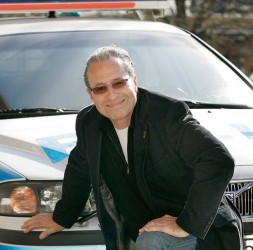 Peter James was educated at Charterhouse, then at film school. He lived in North America for a number of years, working as a screenwriter and film producer before returning to England. His novels, including the Sunday Times number one bestselling Roy Grace series, have been translated into 36 languages, with worldwide sales of 15 million copies. Three books have been filmed. He has also written a short story collection, A Twist of the Knife. All his novels reflect his deep interest in the world of the police, with whom he does in-depth research, as well as his fascination with science, medicine and the paranormal. He has also produced numerous films, including The Merchant of Venice, starring Al Pacino, Jeremy Irons and Joseph Fiennes. He divides his time between his homes in Notting Hill, London, and near Brighton in Sussex.
Peter James was educated at Charterhouse, then at film school. He lived in North America for a number of years, working as a screenwriter and film producer before returning to England. His novels, including the Sunday Times number one bestselling Roy Grace series, have been translated into 36 languages, with worldwide sales of 15 million copies. Three books have been filmed. He has also written a short story collection, A Twist of the Knife. All his novels reflect his deep interest in the world of the police, with whom he does in-depth research, as well as his fascination with science, medicine and the paranormal. He has also produced numerous films, including The Merchant of Venice, starring Al Pacino, Jeremy Irons and Joseph Fiennes. He divides his time between his homes in Notting Hill, London, and near Brighton in Sussex.
To learn more about Peter, please visit his website.
- On the Cover: R. G. Belsky - April 30, 2019
- Between the Lines: John Lescroart - January 31, 2017
- No One Knows by J.T. Ellison - March 31, 2016

